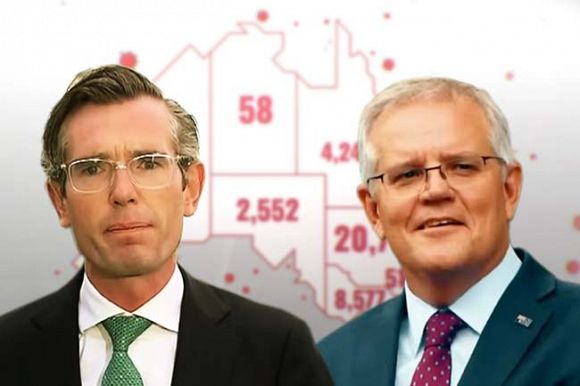The media relentlessly attacks the measures imposed to protect people from COVID instead of reckoning with the severity of this virus, writes Dr Victoria Fielding.
ON AUSTRALIA'S DEADLIEST day of the pandemic so far, when 88 people died of COVID-19, the media cycle chose not to focus on this tragedy, but instead were obsessed with one thing: the Western Australian border closure.
Most journalists would have you think that the worst outcomes from the pandemic are disrupted travel plans.
Perhaps that’s because it’s their travel plans they’re worried about, while seemingly being incapable of showing any empathy for the millions of families worldwide, and thousands in Australia, who have permanently lost loved ones from their lives when those loved ones died of COVID.
Journalists’ tunnel-vision over pandemic health policies like border restrictions, which frames health policies as the villain instead of the virus, is a perfect case study of media-pack groupthink. The media’s anti-border-restriction storyline has become so entrenched over the past two years that even when bleedingly obvious facts like a nationwide COVID crisis undermine it, it remains fixed.
This is what we’re seeing in the media’s coverage of Labor Premier Mark McGowan’s entirely rational, justified, and popular decision to keep the Western Australian border closed.
McGowan explained that he has made this decision to give Western Australians time to buttress themselves against the worst effects of the Omicron variant; he is giving people time to get their booster shots and to have children vaccinated.
As a South Australian who, like many people across Australia, is living in self-imposed lockdown after our State was immediately smashed with the Omicron surge after the border opened in December, I watch Western Australia with envy.
The Omicron variant is less severe than Delta, but this doesn’t make it "mild" overall. We have seen it cripple South Australia’s already fragile and underfunded health system to the point where you’re hard pressed to get an ambulance to arrive for any emergency, let alone a COVID one.
Keep in mind that when South Australia flung open the border with 80 per cent of adults double-vaccinated, we were at the same time learning that two doses of vaccine gave insufficient protection against the highly infectious Omicron variant.
Boosters were needed to protect against severe illness. But when the border opened, the vast majority of South Australians had not had their booster because they weren’t yet eligible. Children aged 5-11 were also unvaccinated because that rollout only started on 10 January.
Whether Premier Steven Marshall had considered or even understood this population wide vulnerability is a moot point. When the Omicron wave hit South Australia, the State went into instant health and economic crisis, joining those other states and territories who either already had Delta circulating and added Omicron to their woes, or also made the regrettable decision to open just as the wave hit.
You would think, watching the Omicron crisis unfold, analysing its impacts and reporting its worst outcomes, journalists might take a look at their anti-border-restriction narrative and reconsider whether a closed border was really such a bad thing, considering the alternative.
Western Australia has used their closed border to protect the public from COVID-19 and have done so exceptionally well. The extension of the closed border won’t save the State from Omicron forever, but it will reduce the number of people who get severe disease and reduce the number of people who die.
That’s what COVID restrictions have always been designed to do: to reduce the worst outcomes of the pandemic.
Those worst outcomes are not travel plans disrupted. They are death.
Like all simplistic narratives, the media’s reports about Western Australia’s border restrictions also tend to misrepresent facts. For instance, not one person in Australia has been locked out of Western Australia for the entire pandemic.
The Western Australian border has been shut more than any other border, but there have been times where residents from any State have been able to visit Western Australia if they wanted to. Anyone who says they’ve been locked out for two years and are now desperate to go from their COVID-infested state to Western Australia right now, in fact just chose not to go to Perth when they had the opportunity.
These decisions are not McGowan’s fault.
I have much sympathy for people who are longing to see their family across borders. The pandemic has dislocated loved-ones across the globe. I have close family in Melbourne and all my husband’s family are in the UK. We talk regularly via Zoom, Facetime and send messages. We are not absent from each other’s lives.
McGowan’s border rules accommodate those with familial ties, aiming to get the balance right between risk with genuinely desperate reasons to travel. All of this nuance is lost though in media coverage, which bluntly opposes the border closures, without apparently considering the alternative: inevitable death and misery, as well as the economic crisis we are seeing in every state and territory apart from Western Australia.
When Queensland Premier Annastacia Palaszczuk was asked by a journalist whether she regretted opening the border, she spoke for every Australian frustrated by the media’s one-eyed opposition to health restrictions, and lack of empathy for those suffering the consequences of covid outbreaks.
She responded:
"You were screaming at me to open the border. I find it ironic that you asked me that question."
Ironic indeed.
Dr Victoria Fielding is an Independent Australia columnist. You can follow Victoria on Twitter @Vic_Rollison.
Related Articles
- Coalition caught napping: Ventilation key to curbing COVID
- Economy over health: Neoliberalism is destroying lives
- Preventing the COVID Apocalypse
- CARTOONS: Community immunity partygoers practise for Darwin Awards
- Outrage over school COVID breeding grounds
 This work is licensed under a Creative Commons Attribution-NonCommercial-NoDerivs 3.0 Australia License
This work is licensed under a Creative Commons Attribution-NonCommercial-NoDerivs 3.0 Australia License
Support independent journalism Subscribe to IA.














